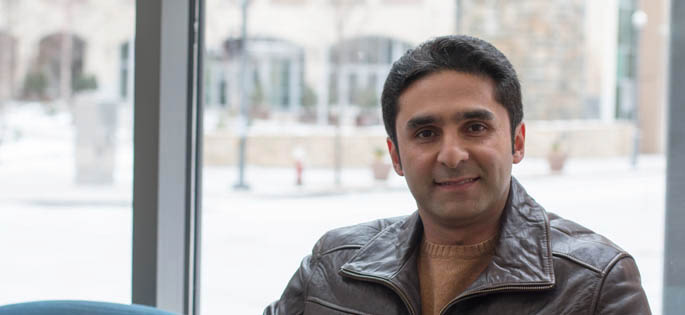New Professor Transfers His International Engineering Expertise to the Classroom Thursday, February 18, 2016

Aram Parsa, Ph.D., P.Eng., recently joined Point Park University as an assistant professor of mechanical engineering technology. Prior to joining Point Park, Parsa was a mechanical engineer for WorleyParsons and HATCH Ltd., in Canada. Before that, Parsa worked with the Canadian Space Agency to study thermal diffusion and the effect of vibration in fluids at the zero gravity environment of the International Space Station. He has also worked as an engineer for consulting companies in Tehran, Iran. Parsa's extensive engineering expertise ranges from fluid mechanics, thermodynamics, heat transfer and computational fluid dynamics to machine design, stress analysis and finite element analysis.
How did you become interested in the field of mechanical engineering?
My interest began back in my childhood where I would dig into my toys to find out how they worked. My parents knew that a new toy they got would only last a few days before I would start to disassemble it to find out its internal mechanism. Also, in high school, I was more interested in physics and mechanics courses than others. In general, I have always enjoyed understanding the mechanisms of different machines, tools and systems.
What brought you to Point Park University?
I worked in the mechanical engineering industry after completing every part of my studies, including two years each after my bachelor's and master's degrees, and almost four years after earning my Ph.D.
I decided to pursue a career in academia so I could be more inspiring to young generations and transfer my experiences and knowledge to them. Through my research, I found Point Park University to be an organization which has continuously grown during the past 55 years. Also, I liked the fact that the University is located Downtown since I am familiar with studying at universities located in downtown areas.
Additionally, I like Pittsburgh and found it to be an ideal size where I can have the advantage of living in a major city but with much less traffic compared to other big cities where I used to live. Pittsburgh is a beautiful city, especially in spring and summer when it's completely green. It is also relatively close to other major cities such as Washington, D.C., Philadelphia, Toronto and New York, allowing for short weekend trips.
So far, what do you enjoy most about teaching at Point Park?
I have students studying all different engineering technology fields in my classes including electrical, civil and mechanical. I like this aspect because I can discuss different examples and applications related to each field. Also, I enjoy teaching in small to mid-size classes where I can interact closely with students to help them learn and understand the material better. It is interesting to have a diverse student population in class - from young traditional students to part-time students coming from the engineering industry and/or military.
Additionally, I have found my colleagues and faculty in the NSET department, as well as the University, to be very professional and respectful.
How do you incorporate your experience working as an engineer in Canada and Iran into the classes you teach?
I try to discuss in class the relevant practical examples from the industrial projects I've worked on over the years. This can help students have a better understanding of the material and also to realize the importance of learning a particular subject in the course. I had the same experience during my own studies where it was inspiring and more interesting when the instructor brought up a practical example in class or assigned an industrial project to work on. I try to follow the same method in my class, using my past experiences working as an engineer.
What career advice do you have for our engineering technology students?
I encourage them to look at the big picture when they study and think about the application of what they learn. I assure them that what they study at the University today will definitely be useful in their future careers in engineering. Also, they should study in a way that they can solve a real problem utilizing what they learned in class. My other advice is to look at different courses as one complete subject. It is usually difficult for engineering students to connect different courses but it's very useful to note when studying that all courses are in some way connected - and it is important to understand these interactions.
Is there anything else you'd like to add?
The new technologies that are available nowadays help human beings in many ways but are not always good for students. My suggestion is to take advantage of the new technologies but do not rely on them too much as they can stop you from thinking.

